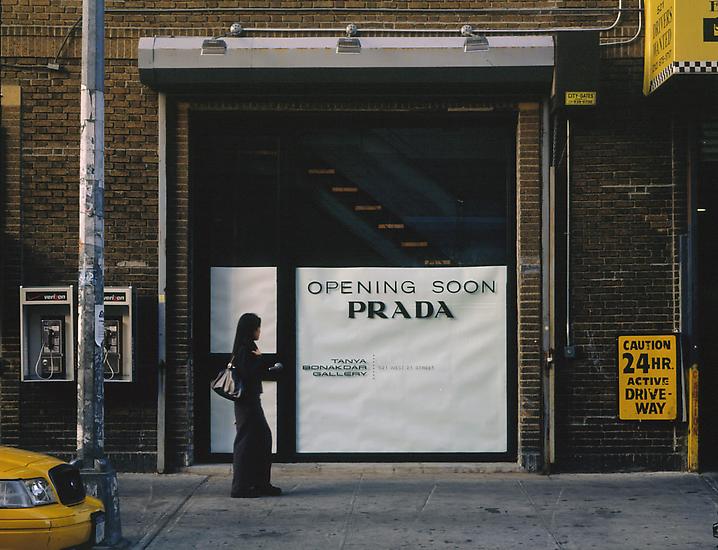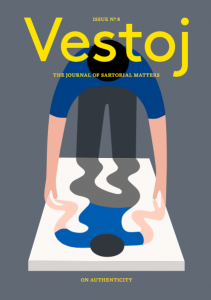
I FLY TO MILAN in the morning and we meet in the afternoon at her company’s headquarters. Our interview takes place in a large tasteful and rather bare office, with her PR director present. We have three voice recorders between us, and her PR takes copious notes as we talk.
***
Authenticity is an original thought, a concept or idea. For a fashion designer it would be someone who invented something that other people go on to copy. But nobody actually cares about authenticity anymore, about who did something first, second or third. Today we have a copy of a copy of a copy. No one talks about authenticity, with the exception of you and a few extravagant intellectuals maybe. As a concept, it’s not relevant anymore. Today it’s considered stupid. The last one to do something, is the one who invented it. Sometimes I think it’s a bit discouraging, but then again I refuse to criticise because you have to live your own moment and deal with it. All our culture derives from other cultures, but authenticity is when you can add something of your own and push things forward. It’s an idea transformed into something concrete. Today everybody is inventing their lives; it’s all embellishment and upgrading. No one tells the truth – I think that’s why we long for authenticity.
I often ask myself why we are completely fixated on fashion and completely ashamed of it at the same time. Maybe it’s because fashion is still seen as a woman’s work, and maybe it’s because we feel shame in talking about ourselves. Clothes after all are about our bodies and appearance and sexuality, and to many people being transparent about those things is too personal. My son sometimes tells me that a lot of his friends would like to work in fashion, but they don’t; it’s as if they think fashion people have rabies. Fashion is associated with something superficial. And I don’t mean the commercial aspect of the industry: often the only thing people like about fashion is that it makes money. I know the feeling well: I’ve been ashamed my whole life about being in fashion. But people in fashion are more cultivated than most – the youngest of my assistants knows more than any bank manager about art, about cinema. We have to be educated to work in this industry. Having said that, fashion is for people with no problems; it’s for moments of pleasure. When you’re in pain, aesthetics doesn’t exist. If you’re sick, you don’t care about clothes. During war, art stops.
I do have enormous respect for fashion though – I want to make that clear. I don’t think it’s in any way less valid as a creative discipline. To work in fashion you have to be open, educated, curious. Maybe the people who still see fashion as inferior are just more bourgeois than I am. Maybe they have preconceived ideas or maybe they are just afraid of what people will think or say if they go into fashion. I know a lot of people in that genre. You know, the ones who think they are too chic, too smart, too intellectual to work in fashion. Sometimes I have fun thinking about the fall of the super intellectual: the one who thinks he’s above the vulgarities of everyday life. The people who really practice what they preach are very few. Perhaps that’s true authenticity.
I like to work against things: if something is luxurious I want to make it cheap, if something is cheap I want to make it look luxurious. That’s my way of thinking so I’m in constant conflict with myself. We’re luxury, but not luxury – and anyway luxury is such an abused word today. I have more doubts than certainty, and I encourage constant change. I hate when companies become too well-defined. I have a hard time with branding, when you have to reduce a company to a few chose terms. It’s so superficial: it irritates me and makes me suffer. We still have to do it, I know, but I try to do it in a way that is a bit more anarchic. Sometimes we do it well, sometimes badly because we don’t do it from a perspective that is only about being rational or commercially valid. The problem now is that we are big so we can’t be completely experimental. I want us to be even more daring or bold, but we have different responsibilities than we used to. To reduce all the ideas that goes into making a collection into a few words upsets me, because simplifying something complex makes it superficial. But then again, to try and make it sound intellectual, I also hate. I do know the limits that I can move within, I know who I am and who we are, and how big the company is and what that means. So far I think I’ve dealt with what I have decently, though I know that by choosing not to be loud and superficial I won’t reach as many people. But I want to introduce some humanity and intelligence into fashion and I’ve made the choice not to be understood by everybody. Being popular, convincing and clever is a difficult balancing act. If you’re niche, you don’t have that problem but then again you speak only to people like yourself.
In my work I have to behave in a way that I both like and don’t like. It’s tricky. A struggle. I want to be able to be open with a journalist for example, but what used to be talking to a niche magazine, today can be taken out of context and go viral in an instant. You just have to be more careful. Now I’m sitting here talking to you, emissary from a very sophisticated journal, but I know that I’m really talking to everybody else too. But to compromise is not a bad thing, you have to compromise with everybody – your kids, your husband, everybody. It’s what democracy is all about, though democracy doesn’t seem to be so trendy at the moment. You can still achieve a lot within a compromise – it’s not like it makes you another person. The compromise is necessary to get things done. We have tried doing highly sophisticated things, but in the end no one bought them. For me making concessions is essential to at least say something; if no one listens all you end up doing is talking to yourself. Don’t misunderstand me though: I’m not saying that only if you’re big can you be influential. Many small things can together have an impact. Of course you can choose to step out of the system. It’s what Azzedine Alaïa did. But he was small, and he liked to work in the tradition of the artisan, to do everything by himself.
I’m intuitive. I tend not to analyse. I don’t think of myself as an artist. To me art is pure, it’s not made with commerce in mind. That’s why it’s important for me to separate art from fashion. Do you know how many important artists have asked me to do bags with them? I won’t do it, because I think the two disciplines should be kept separate. Maybe, because of the way I grew up, I still have too much respect for the art world and the intelligentsia: I never wanted to take advantage of artists to make my work in fashion more valuable. I decided that a long time ago, and though now I might think differently I’ve stuck with it, just out of principle. So many people within the company have tried to make me change my mind, but I won’t – sometimes you have to protect your principles, even if they’re stupid.
When you’re alone with a friend you can allow yourself to say things that are politically incorrect. It’s important to; no thought can advance if you have to remain politically correct all the time. But censorship is huge now. Basically you can’t say anything interesting on the record. I did an interview with a very important journalist some time ago, but then I told him to cancel eighty percent of what I’d said. I know that makes me the censor but I don’t want to ruin my life over an interview. I have responsibilities. It’s hard because whatever I do, someone ends up being upset. A company our size has to think about everything. I made the choice not to be niche, only for the sophisticated few, so I have to accept the limitations of that choice. I prefer to make what is perhaps sometimes not so good but its reach is wide. I want to understand the habits of the Arabs, of the Chinese… I want to understand how different cultures respond to different things; ultimately that’s much more interesting and challenging to me. It does mean though that I can’t be totally independent in what I do.
In my life I’ve passed through many moments, and many that have been freer than the one we’re living through today. Even in fashion you notice this. We are undergoing a major revolution in terms of communication, and I understand the limits of this moment in time. I remember when travelling meant you actually had to stop talking on the phone – now everybody just keeps on talking. Not me. Or at least not as much. I don’t have social media; I don’t even have a computer. So far I’ve refused to engage because I knew it would only mean more work. But I’ve been told that it’s the only thing that people look at nowadays, and that I’d better get involved so since one month I’m studying the internet. I’m looking at social media and everything else that goes on the macchinetta. I want to learn how to respond to it, because online you can really find boundless superficiality and stupidity, but also – I hope – super clever things.
The speed of fashion is stressful, but fantastic. We can do things in months that would take years for an institution or museum. We do the Prada show in one month, and the Miu Miu show in ten days. Granted, I have a monster machine behind me. I know people complain about the pace but I change my opinion all the time, and get bored easily so it works for me. I try to think of every aspect of my work as small parts of a bigger whole, ashes of ideas, and I’ve found that it makes my attitude to work easier. I don’t have to think, ‘Oh my god, there’s a show coming up and I have to be a genius, I have to be good, I have to deliver.’ It takes the pressure off and helps me keep perspective. I can get bored at times and just let people do what they want, and sometimes I can regret that. But ultimately my life is more important – I can’t control everything and sometimes I have to just let things go. I don’t always want to go into our shops because I always notice things I would like to have done differently, and I have to stop with that. Sometimes I get hysterical and give directions all over the place, and I have to stop with that too. I can’t let my work take over my life. Thanks god I have more things to my life than work, so if a horrible dress slips through the cracks, so what? Life is always more important.
Anja Aronowsky-Cronberg is Vestoj’s editor-in-chief and founder.
This article was originally published in Vestoj: On Authenticity, available for purchase here.
